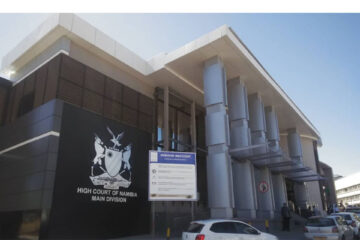Niël Terblanché
Construction work on a new water treatment plant for Rundu began with a groundbreaking ceremony held on Monday.
The Minister of Agriculture, Water and Land Reform, Calle Schlettwein, officiated at the ceremony.
He stressed the importance of the project for Rundu, Namibia’s second-largest local authority with a population of approximately 118,000.
“As one of the fastest-growing towns in Namibia, Rundu has faced increasing strain on its water supply, a challenge this new project aims to address comprehensively,” the minister said.
Three weeks ago frustrated residents of Ndama’s Sun City and Long to Long settlements threatened a community uprising in an ultimatum to the Rundu Town Council.
Protesting residents demanded that the local authority restore their water supply within seven working days or face the ousting of mayor, Gabriel Kanyanga.
The water supply crisis, which has been ongoing since September 2023 gave rise to the vandalism of pipes in order to provide people access to water.
On Monday, Schlettwein said that Rundu’s current water supply infrastructure, which relies on two abstraction installations and conveyance pipelines from the Kavango River, is operating at full capacity.
The existing water treatment plants at Rundu and N’karapamwe are direct filtration systems with a total capacity of about 840 cubic meters per hour, but these systems are old and have reached the end of their economically useful life.
According to the minister, the water distribution network in Rundu loses nearly 50% of its water supply capacity because of leakages, which further drive up costs due to its inefficiency.
To tackle these issues, the government secured a financing agreement with the African Development Bank (AfDB) in 2020.
Part of this loan is allocated to the construction of the Rundu Purification Plant Extension.
The project, costing N$665 million, is part of a broader N$1.8 billion loan facility under the Namibia Water Sector Support Program, which also includes projects like the Ohangwena II Well Field Water Supply Schemes and the Oshakati new purification plant.
Schlettwein said that the government has committed an additional N$1.5 billion to ensure the successful implementation of all projects under this program.
The Rundu Water Treatment Plant Extension Project encompasses several key developments.
A new raw water River Abstraction Works on the Kavango River with an installed pumping capacity of 40,000 cubic meters per day, expandable to 80,000 cubic meters daily, is planned.
A new water purification plant with an installed capacity of 36,000 cubic meters per day, expandable to 72,000 cubic meters, will be constructed, along with additional storage reservoirs totalling 35,500 cubic meters in volume. New pump stations with dedicated pipelines to existing and new elevated reservoirs at Rundu and N’karapamwe will also be built.
Schlettwein noted that the new infrastructure is designed not only to serve Rundu but also to extend to surrounding communities within a 100-kilometre radius.
He said that extension pipelines will be constructed from N’karapamwe to Kayengona and Masivi and from Rundu to Mupini and Sikondo, allowing these communities to tap into the new system.
He added that the infrastructure would be scalable for future expansions, such as extending the Masivi pipeline to Katjina-katji in the Kavango West Region.
Schlettwein, however, stressed the importance of financial sustainability in water supply.
NamWater, responsible for treating and distributing water, incurs significant costs, including high electricity bills.
The Rundu Town Council alone owes NamWater over N$280 million in unpaid water bills, contributing to a total debt of more than N$2.1 billion owed by town councils and individual consumers.
“To address this, the introduction of pre-paid bulk water meters for town councils and individual consumers is planned, ensuring a cost-recovery model for continuous water supply operations,” he said.
Schlettwein also stressed the importance of the economic and social impact of the project.
“Access to clean, safe water is a fundamental human right and essential for public health, industry, and overall socio-economic development. By ensuring a reliable water supply, the project lays the foundation for a brighter future for Rundu and its surrounding communities,” he said.




